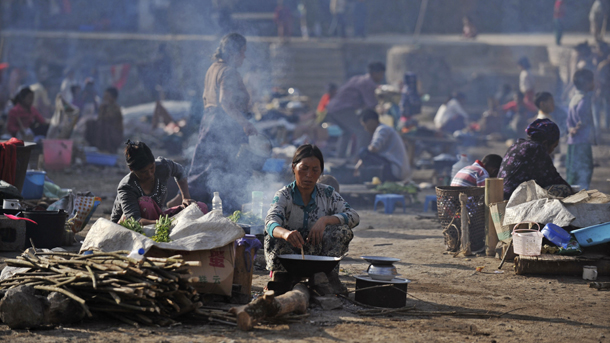Local Kachin groups have told The Irrawaddy that the Burmese army is preventing UN aid agencies from transporting humanitarian supplies to 30 refugee camps sheltering thousands of Kachins who are now facing severe food shortages.
“The UN convoys were only permitted to transport aid to the five camps that are in the Mae Ja Yang area. There are 30 other sites still waiting for food and other supplies,” said Samang Kada Doi Pyi Sa, the chairman of the IDPs and Refugees Relief Committee, which is based in the town of Laiza along the Sino-Burmese border.
Laiza also hosts the headquarters of the Kachin Independence Organization (KIO), which is engaged in an ongoing conflict with Burmese government forces in Burma’s restive northernmost region. In recent days, the Burmese army has reinforced its positions around the city where some 10,000 refugees or displaced persons are currently sheltering.
Deprived of UN aid, refugees depend on supplies from the KIO. However, local groups say that the Kachin army is only able to provide the most basic rations such as rice, fish paste and salt.
“There are 1,500 schoolchildren who need education, but we do not have enough teachers or space for schools or classrooms. We can only cope with part-time classes,” said La Rip, the coordinator of the Laiza-based Relief Action Network for Refugees.
He said that, typically, one teacher in Laiza managed about 100 students in one class. In other KIO-controlled areas, there are not enough schools to accommodate an estimated 21,000 children nor are there funds to build more schools.
“The UN has a duty to help these refugees,” said Samang Kada Doi Pyi Sa, echoing the view from other local Kachin groups that the UN must find other ways to deliver its aid to those in need.
“The UN cannot just wait until the Burmese government gives them permission to enter,” he said. “They must take the initiative now—before it is too late.”
Aid workers at camps have also voiced grave concerns over sanitary conditions, especially during this rainy season when tropical diseases can easily spread.
Fighting in Kachin State broke out last June, ending a 17-year-old ceasefire between the KIO and government forces. Since then, about 70,000 villagers have been forced to flee their homes. The KIO says the Burmese government is fighting to gain control of the natural sources in Kachin State. Repeated attempts at negotiations and orders by Burmese President Thein Sein to find a ceasefire have so far failed to end military operations.

















